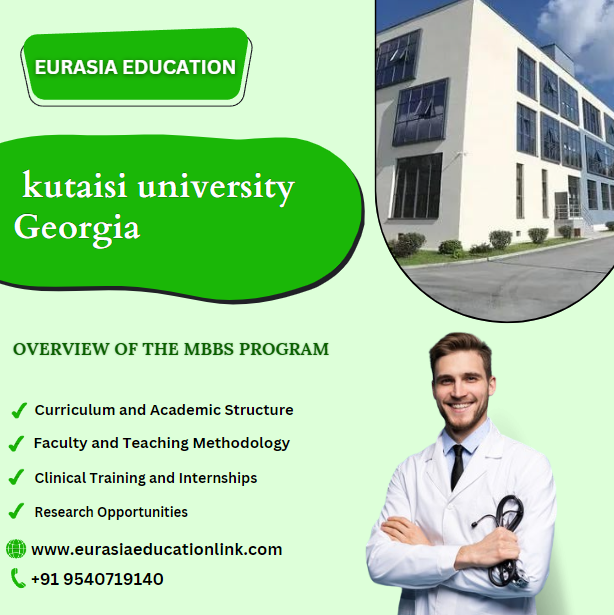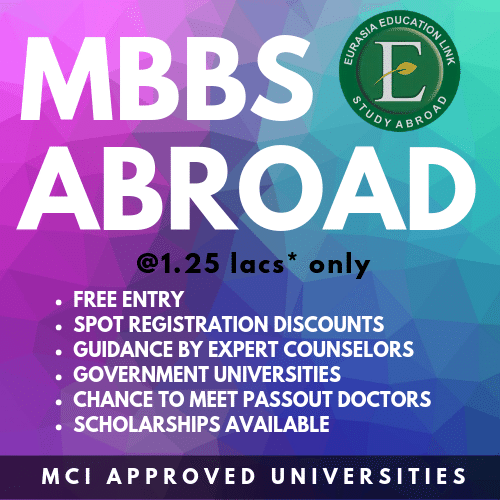Kutaisi University, situated in the picturesque city of Kutaisi, Georgia, is renowned for its high standards of education and its commitment to fostering future medical professionals. The MBBS Campus of Medicine at Kutaisi University stands out for its rigorous academic programs, state-of-the-art facilities, and a holistic approach to medical education. This blog provides a detailed overview of what makes the MBBS program at Kutaisi University's Faculty of Medicine a distinguished choice for aspiring doctors.
Overview of the MBBS Program
The MBBS (Bachelor of Medicine, Bachelor of Surgery) program at Kutaisi University is designed to equip students with comprehensive medical knowledge and practical skills. The program spans six years and is structured to progressively develop students' competencies in medical sciences, clinical practice, and patient care.
Curriculum and Academic Structure
The MBBS curriculum at Kutaisi University is divided into three main phases:
1. Pre-Clinical Phase (Years 1-2):
- Focuses on foundational medical sciences such as Anatomy, Physiology, Biochemistry, and Histology.
- Emphasizes the importance of understanding the human body's structure and function.
- Courses in medical ethics, medical terminology, and early clinical exposure are included.
2. Clinical Phase (Years 3-4):
- Introduces students to clinical subjects including Pathology, Pharmacology, Microbiology, and Forensic Medicine.
- Students begin hands-on clinical training, learning to interact with patients and develop diagnostic skills.
- Practical sessions, laboratory work, and simulated clinical environments are integral to this phase.
3. Final Phase (Years 5-6):
- Focuses on advanced clinical training in major specialties such as Internal Medicine, Surgery, Pediatrics, Obstetrics and Gynecology, Psychiatry, and Emergency Medicine.
- Includes rotations in various hospital departments, allowing students to gain real-world experience under the supervision of experienced medical professionals.
- Prepares students for internships and residency programs through intensive practical training and case studies.
Faculty and Teaching Methodology
The Faculty of Medicine at Kutaisi University boasts a team of highly qualified and experienced educators, including professors, researchers, and practicing doctors. The teaching methodology is a blend of traditional lectures, interactive seminars, problem-based learning, and hands-on clinical training. This comprehensive approach ensures that students receive a well-rounded medical education.
State-of-the-Art Facilities
Kutaisi University's MBBS campus is equipped with cutting-edge facilities to support the academic and practical needs of medical students:
- Modern Classrooms and Lecture Halls: Equipped with advanced audio-visual aids to facilitate effective learning.
- Well-Equipped Laboratories: Provide students with opportunities to conduct experiments and gain practical experience in subjects such as Biochemistry, Microbiology, and Pathology.
- Clinical Skills Centers: Simulated patient environments where students can practice medical procedures and patient interactions in a controlled setting.
- Library and Research Facilities: A vast collection of medical books, journals, and online resources to support students' research and study needs.
- Hospital Affiliations: Partnerships with local hospitals and clinics for clinical rotations, ensuring students gain diverse clinical exposure.
Clinical Training and Internships
Clinical training is a cornerstone of the MBBS program at Kutaisi University. Students are provided with extensive hands-on experience through clinical rotations in various specialties. These rotations take place in affiliated hospitals and clinics, where students work under the guidance of experienced doctors. This real-world training is crucial in developing the clinical skills and confidence required to excel in medical practice.
Research Opportunities
Kutaisi University encourages its medical students to engage in research activities. The university's research centers and laboratories provide ample opportunities for students to participate in research projects, contributing to the advancement of medical science. Students are also encouraged to present their research findings at national and international conferences.
Student Life and Support Service
The MBBS Campus of Medicine at Kutaisi University offers a vibrant student life with various extracurricular activities, student organizations, and cultural events. The university provides comprehensive support services, including academic advising, career counseling, and mental health support, ensuring that students have the resources they need to succeed both academically and personally.
Global Recognition and Career Prospects
The MBBS degree from Kutaisi University is recognized globally, opening doors to numerous career opportunities for graduates. Upon completion of the program, students are eligible to take licensing exams in various countries, allowing them to pursue medical careers worldwide. The rigorous training and diverse clinical exposure equip graduates with the skills and knowledge needed to excel in their medical careers.
















May 3, 2025
ReplyApril 29, 2025
ReplyApril 28, 2025
ReplyApril 27, 2025
ReplyApril 19, 2025
ReplyApril 15, 2025
ReplyApril 13, 2025
ReplyApril 11, 2025
ReplyApril 10, 2025
ReplyApril 8, 2025
ReplyApril 8, 2025
ReplyApril 5, 2025
ReplyMarch 31, 2025
ReplyMarch 27, 2025
ReplyMarch 16, 2025
ReplyMarch 3, 2025
ReplyMarch 2, 2025
ReplyFebruary 28, 2025
ReplyFebruary 20, 2025
ReplyFebruary 20, 2025
ReplyFebruary 19, 2025
ReplyFebruary 16, 2025
ReplyFebruary 14, 2025
ReplyFebruary 12, 2025
ReplyFebruary 10, 2025
ReplyFebruary 6, 2025
ReplyFebruary 5, 2025
ReplyFebruary 1, 2025
ReplyJanuary 28, 2025
ReplyJanuary 24, 2025
ReplyJanuary 21, 2025
ReplyJanuary 20, 2025
ReplyJanuary 18, 2025
ReplyJanuary 16, 2025
ReplyJanuary 10, 2025
Reply